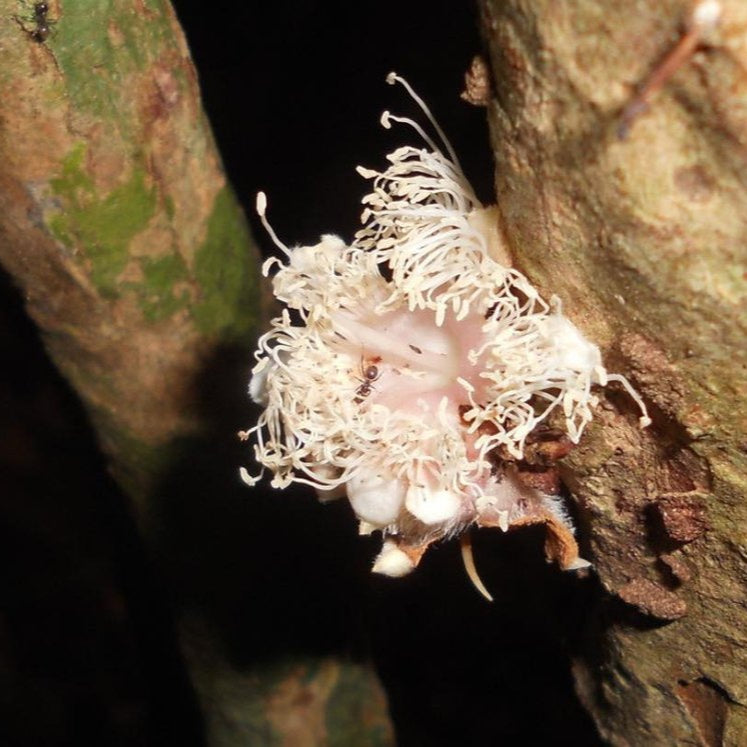Love it? Add to your wishlist
Your favorites, all in one place. Shop quickly and easily with the wishlist feature!
[message]
[title]
[message]




Veliyath Gardens
Couldn't load pickup availability
Botanical Name: Plinia longiacuminata
Common Name: Long Acuminate Jaboticaba, Pink Jaboticaba (Unofficial/Common Reference)
Among the deep forest canopies and the rich biodiversity of Itacaré, Bahia, grows an elusive member of the Jaboticaba family — Plinia longiacuminata. This ultra-rare species has only recently caught the attention of tropical fruit enthusiasts. Its beauty, novelty, and under-canopy adaptability make it a truly exotic addition to any garden.
Unlike the common Jaboticabas, this species produces larger fruits, flushed with a rosy pink hue when ripe — a distinguishing feature that sets it apart within its genus. The tree stays relatively small, growing up to 6 or 7 meters in height, making it ideal for limited-space cultivation or pot culture in suitable climates.
Growth Form: Medium-sized, slow-growing understory tree
Leaves: Long and pointed, resembling those of Plinia rara
Fruit Formation: Cauliflorous — fruits appear directly on the trunk
Fruit Color: Ripens from green to rosy pink
Fruit Size: Notably larger than common Jaboticabas
This combination of rare foliage, color, and growth habit adds ornamental value, making Plinia longiacuminata not only a fruit-bearing plant but also an aesthetic centerpiece for gardens.
The fruit offers a delightful experience:
Texture: Smooth, with juicy translucent pulp
Flavor: Sweet and aromatic, with a mild floral undertone
Aftertaste: Clean and refreshing, with a very low acidity
Use: Best consumed fresh, straight from the tree
It’s a true gourmet delight — a tropical fruit that captures the essence of rainforest sweetness. While it can also be used in artisanal preserves or drinks, its taste is best savored naturally, without heavy processing.
Though specific studies on this rare species are limited, being a member of the Jaboticaba family suggests several nutritional parallels:
Rich in antioxidants – especially anthocyanins and polyphenols
Good source of Vitamin C – boosts immunity and skin elasticity
Contains dietary fiber – supports digestion and regulates metabolism
Low glycemic index – safe for moderate consumption by diabetics
Anti-inflammatory properties – traditionally used in folk remedies for sore throats and respiratory issues
Including this fruit in your seasonal diet can provide not just taste, but a powerful burst of nutrients with medicinal resonance.
While still relatively unknown outside specialist collectors and botanical circles, this fruit is gaining attention in Brazil as a rare cultivar worthy of conservation. Unlike the widely cultivated Jaboticabas, Plinia longiacuminata is found only in select pockets of the Atlantic rainforest, and it holds immense value for biodiversity and ecological heritage.
Its pink fruit is celebrated as a symbol of tropical rarity and botanical prestige among enthusiasts in Brazil and parts of Central America. Small-scale growers in Costa Rica and Colombia have begun identifying similar relatives, though none match the elegance and size of the Bahia strain.
This plant is a rewarding challenge for growers willing to nurture it with care and patience:
Soil: Prefers rich, well-draining soils with slight acidity
Watering: Regular moisture required, but never waterlogged
Light: Partial shade to filtered sun, mimicking its native understory habitat
Temperature: Thrives in humid tropical to subtropical climates
Fruiting Time: Usually begins producing in 5 to 7 years from seed
Maintenance: Moderate; requires mulching and occasional pruning for airflow
It is best suited for gardeners who understand the slow but rewarding journey of Jaboticaba species.
Once harvested, the fruits can be stored in the refrigerator for up to a week, though they are best eaten fresh. They can be:
Frozen for smoothies or desserts
Made into jellies or syrups for tropical-style spreads
Fermented into wines or liqueurs for exotic blends
Used fresh as a beautiful garnish in fruit platters or salads
Its vibrant pink skin makes it a visual and culinary delight in both traditional and modern recipes.
Rare and highly sought-after in collector circles
Eye-catching fruits that grow directly on the trunk
Beautiful foliage and compact form
Offers nutritional value and exquisite flavor
Supports conservation of threatened tropical species
Owning Plinia longiacuminata is not just about harvesting fruit — it’s about embracing a rare relationship with nature.
Due to its extremely limited propagation and increasing demand among rare fruit lovers, Plinia longiacuminata Live Plants are in short supply at Veliyath Gardens. We encourage early bookings for those interested in cultivating this one-of-a-kind treasure.
At Veliyath Gardens, we don’t just sell rare plants — we curate knowledge. Our initiative to document and share authentic information about exotic fruits, such as Plinia longiacuminata, is the first of its kind. We aim to empower fruit enthusiasts, botanists, and gardeners with botanical facts, cultural backgrounds, and best practices, all under one roof.
If you’re ready to bring home a living rarity that reflects beauty, resilience, and taste, Plinia longiacuminata deserves a place in your collection. This fruit plant not only enhances your space but deepens your connection to nature’s undiscovered wonders.
Let your garden grow rare — one pink Jaboticaba at a time.
Watering: Regular moisture required, but never waterlogged
Light: Partial shade to filtered sun, mimicking its native understory habitat
Temperature: Thrives in humid tropical to subtropical climates
Rich in antioxidants – especially anthocyanins and polyphenols
Good source of Vitamin C – boosts immunity and skin elasticity
Contains dietary fiber – supports digestion and regulates metabolism
Low glycemic index – safe for moderate consumption by diabetics
Rare and highly sought-after in collector circles
Eye-catching fruits that grow directly on the trunk
Beautiful foliage and compact form





